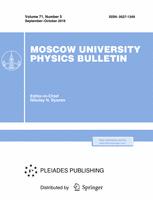The special features of states when the Schrodinger uncertainty relation $\Delta^2A\Delta^2B\ge(\hbar^2/4)|\langle C\rangle|^2/(1-r^2)$ $(\hat{C}=[\hat{A},\hat{B}]/i\hbar$ i1i and r is the correlation coefficient between А and В) turns into the equality have been examined. It has been shown that if, indcpendently of state, we can obtain (С) = О bу changing the point of reference, then the state $|\Psi\rangle$, for which the Schrodinger relation is the equality, is an eigenstate of the operator А or В and does not correspond to an analytical solution of the equation $\hat{A}=\hat{p}^2,$ $\hat{B}=\hat{x}$, whcre а: is а c-number. It was demonstrated that for $\hat{A}=\hat{p}^2, and $\hat{B}=\hat{x}$, the state, when the equality $\Delta^2 p^2\Delta^2 x^2=(\hbar^2/4)|\langle \hat{p}\rangle|^2$ holds asymptotically, can bе considered as the limit of the Gaussian state when $\Delta p \to 0$.
Department of Molecular Physics and Physical Measurements



